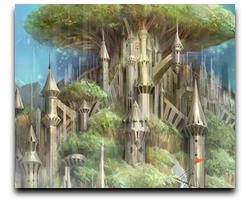 Microsoft, Sony and Nintendo have great visions for their consoles, they all strive to stand out from their competitors. Nintendo’s key initiative is to get non-gamers on board and provide the world with something a little different while Microsoft’s concept is to get a 360 into the hands of all gamers and build a huge community. Sony’s selling point? Graphics.
Microsoft, Sony and Nintendo have great visions for their consoles, they all strive to stand out from their competitors. Nintendo’s key initiative is to get non-gamers on board and provide the world with something a little different while Microsoft’s concept is to get a 360 into the hands of all gamers and build a huge community. Sony’s selling point? Graphics.
When it comes to standing out amongst the other consoles, Sony cannot compete with the Wii‘s quirky cuteness and Xbox 360‘s one-year lead on sales, games and overall functionality. They were late to the game because of technological advances in Blu-Ray and overall graphic horsepower. They’re providing a console that will still look “teh awesomes” ten years down the road, similar to the attack plan of the PS2 product which still sells today.
Sony’s Scott Steinberg, Vice President of Product Marketing for SCEA had nothing but great things to say about the console he’s marketing…
“I think that we’re seeing, graphically, PS3 games starting to create some distance and some of the other competitors are going to feel that they’re getting long in the tooth, looking quite dated, because they haven’t created that ten-year vision from a horsepower standpoint” (psu.com)
Really? Does anyone look at the Xbox 360 and say “this thing looks dated.” Each new title release continues to look more advanced and more graphically appealing than the last. Sure, Resistance 2 looked graphically epic, but the title isn’t on the shelves yet. As a matter of fact, very few PS3 titles are on the shelves when it comes to graphically appealing titles everyone wants.
As Nintendo has proven, it’s not always about the advanced graphics but the fun value and access to many titles across many genre’s of gaming. We’re happy about a nice 10-year vision but there is a reason classic games like Pac-Man, Missile Command and Galaga are still talked about and played by gamers: simple and fun.
Microsoft may not have a ten year vision, this is true, but I’d rather have a hot console I can play for the next six years than own a more expensive console with few games until its third year of life. The PlayStation 3 has been beating the Xbox 360 sales in 2008, is this too surprising given the fact that the Xbox 360 was out a year ahead? Sales aren’t always going to be rosy and over the top (unless it’s the Wii).
Rather than concentrate on how many more consoles the PS3 has sold compared to the 360, look at how many Wii consoles have sold to the graphically superior PS3. Perhaps Sony should speak less to the gamers about how awesome their console is and speak more to the developers so we can get titles worth buying for the console. Gamers only win when a console has games for them to play.

 CNet is
CNet is  There is room to grow in the world of massive multiplayer online gaming. A large online community should not have to subscribe to a monthly charge to play great MMORPG’s because there are other known models that work, including the micro-transaction based MMO.
There is room to grow in the world of massive multiplayer online gaming. A large online community should not have to subscribe to a monthly charge to play great MMORPG’s because there are other known models that work, including the micro-transaction based MMO.